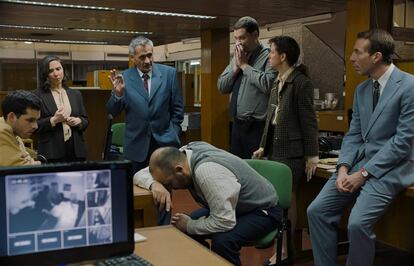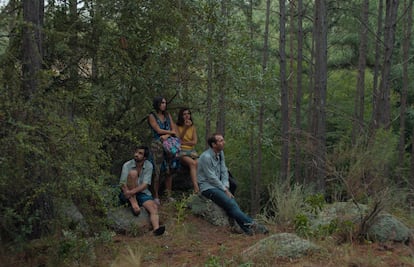‘The Delinquents’: A slow-burn heist
Director Rodrigo Moreno has made a deliberately bland, humorous thriller over 189 minutes that will either drag or grip audiences

Some will say that the first five minutes of The Delinquents by Argentinian director Rodrigo Moreno are already three minutes too long. Others will revel in the three-hour running time of the movie. Its critics will be those who remember the movie Jeanne Dielman, 23 Commerce Quay, 1080 Brussels by Chantal Akerman as the one in which a woman peels potatoes for what feels like hours. But cinema is all about pace. The mystery and the sensation of it, the truth and the lie. “Where does the strength of a filmmaker’s art lie?” Andrei Tarkovski asked himself, before answering his own question: “In sculpting time.”
Now, as we need a brand name for everything, we call Moreno’s approach slow cinema. But it is nothing new. It has always been around. And it is not so much slow cinema as a strange and fascinating fusion of calmness, responsibility, style and intuition. That’s when it turns out well, of course, because there have been and there will continue to be films that are just a yawnfest wrapped in pretention. This is not the case with The Delinquents, however, an evenly paced and playful heist movie. Moreno has told his tale with serenity and humor, and its 189 minutes can either seem eternal or exciting, depending on whether you think that Jeanne Dielman peeling potatoes is excruciating or a wonderful reflection on oppression and women’s liberation.

In fact, The Delinquents is much more than a film about a bank robbery by one of the bank’s employees. It is Moreno’s study on freedom. Surely the same view of freedom that drove the protagonist Fernando Galindo played by José Luis López Vázquez to rob his own bank in Robbery at 3′O Clock, or the timid bureaucrat Henry Holland played by Alec Guinness in The Lavender Hill Mob to take possession of the gold bullion he saw every day, albeit done in a manner radically removed from the styles of classic entertainment gurus José María Forqué and Charles Crichton.
Instead, Moreno has come up with a heist film that is bland to the point of caustic. It is a story with unpredictable plot twists and characters anchored in the mundane, whose behaviors seem absurd but which are in fact the inevitable consequence of the confinement power and work subject us to. What is the meaning of life? Working from sunrise to sunset? The thief’s objective is not to become a millionaire: it is simply to obtain exactly the same amount that he would earn until the moment of his retirement, so he can ditch the daily grind.
We have already seen Moreno’s magnificent debut The Minder (2006), a story of a parliamentary minister’s bodyguard in the midst of an existential crisis, which is also a praiseworthy exercise in coherently balancing form and content. The director starts from a central story which then unfolds or mutates into many others, including the possibility of another life, particularly a personal one, acted out against a soundtrack that is at once dissonant and retro, baroque as well as popular and light.
Inspired by the 1949 classic of Argentine crime/noir cinema, Hardly a Criminal by Hugo Fregonese, — also based on embezzlement and definitely worth watching — The Delinquents got rave reviews at the Cannes Film Festival, and is now in cinemas, offering us humor, an alternative perspective on genres and wisdom about the human condition worthy of three hours of our time.
The Delinquents
Director: Rodrigo Moreno.
Cast: Esteban Bigliardi, Daniel Elías, Margarita Molfino, Germán de Silva.
Genre: thriller. Argentina, 2023.
Duration: 189 minutes.
U.S. release date: October 18, 2023.
Sign up for our weekly newsletter to get more English-language news coverage from EL PAÍS USA Edition
Tu suscripción se está usando en otro dispositivo
¿Quieres añadir otro usuario a tu suscripción?
Si continúas leyendo en este dispositivo, no se podrá leer en el otro.
FlechaTu suscripción se está usando en otro dispositivo y solo puedes acceder a EL PAÍS desde un dispositivo a la vez.
Si quieres compartir tu cuenta, cambia tu suscripción a la modalidad Premium, así podrás añadir otro usuario. Cada uno accederá con su propia cuenta de email, lo que os permitirá personalizar vuestra experiencia en EL PAÍS.
¿Tienes una suscripción de empresa? Accede aquí para contratar más cuentas.
En el caso de no saber quién está usando tu cuenta, te recomendamos cambiar tu contraseña aquí.
Si decides continuar compartiendo tu cuenta, este mensaje se mostrará en tu dispositivo y en el de la otra persona que está usando tu cuenta de forma indefinida, afectando a tu experiencia de lectura. Puedes consultar aquí los términos y condiciones de la suscripción digital.









































